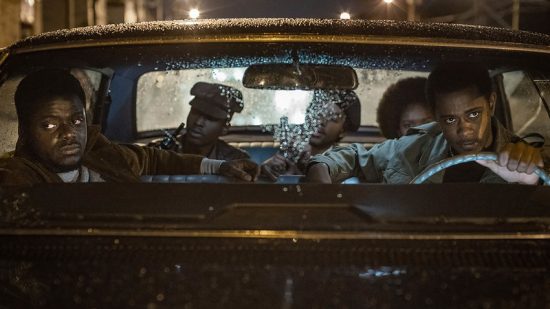Sundance 2021 Review: Judas and the Black Messiah – “Compelling and powerful work”

Daniel Kaluuya, Ashton Sanders, Algee Smith, Dominique Thorne and Lakeith Stanfield appear in Judas and the Black Messiah by Shaka King, an official selection of the Premieres section at the 2021 Sundance Film Festival. Courtesy of Sundance Institute | photo by Glen Wilson.
On the night of December 4, 1969, Chicago Police raided the apartment of Fred Hampton, assassinating him while he lay unconscious after having been slipped a sleep-inducing drug. His pregnant girlfriend, Deborah Johnson, almost at her due date, was beside him. Fred Hampton, who was a leader in the Illinois chapter of the Black Panther Party had his life ended at age 21. Chicago Police fired ninety-nine shots during the raid, killing one other man (Mark Clark) and injuring others. The Panthers only shot once.
The history of Hampton’s premature demise is depicted in director Shaka King‘s second feature, Judas and the Black Messiah. It tells the story through the lens of the man who will eventually betray him, the titular Judas, Willian O’Neal (LaKeith Stanfield). We meet him in a long overcoat, wide-rimmed hat covering most of his face, flashing a badge in a scam to steal cars. Why a badge? As he later explains, “A badge is scarier than a gun.” And his gimmick works, until it doesn’t. His arrest is seen as an opportunity by FBI agent Roy Mitchell (Jesse Plemons) who strikes a deal with O’Neal to infiltrate the Chicago Black Panther Party. His goal? To get close to Fred Hampton (Daniel Kaluuya), whose rise within the Party has been seen as a threat and whom the FBI (including a prosthetic wearing Martin Sheen as J. Edgar Hoover) wishes to neutralize.
While this film is compelling from a historical perspective alone, it’s the performances which elevate Judas and the Black Messiah. Kaluuya, who has of course already proven his considerable abilities in films like Get Out and Widows, injects Hampton with all the charisma and determination required to bring this figure to the screen. When, as chairman, he stands before his considerable audiences speaking powerfully about the revolution at hand, you can feel the fire within him. “I am a revolutionary!” he proclaims and everyone believes. It’s that magnetism that allows him to recruit to the cause, to make allies of enemies and to eventually form the Rainbow Coalition. Kaluuya captures these elements with fervency.
While Hampton has a clear directive, it’s O’Neal and Mitchell who act through shades of grey, and director Shaka King embraces this, showing how each of their parts in the eventual murder of Hampton were orchestrated. Mitchell, who starts off as the agent offering O’Neal ‘opportunity’ eventually ends up ditching his moral ambiguity and ‘nice guy’ persona entirely to force the hand of his obviously emotional informant. It’s when this happens that Plemons is particularly potent, a frightening adversary who holds all the cards. Stanfield is deftly able to play both sides of the fence, as his character must – at times almost revelling in his deception, enjoying the perks of his informant status and then quickly switching to believable sincerity. We never forget that from the start he was a con-man. As the consequence of his betrayal finally hits O’Neal, Stanfield’s emotional breakdown is restrained but powerful.
I would be remiss if I also didn’t mention Dominique Fishback who plays Deborah Johnson, Hampton’s partner. She also has an incredible performance here, perhaps the soul of the piece to Kaluuya’s heart. King decides in the final moments of the film to close in on Fishback’s face, Hampton’s death in the background only, and the effect only intensifies the visceral reaction of everything that’s come before. In this moment she is resolute and unwavering, but anger reverberates in your bones.
King crafts his work carefully, and while Judas runs over two hours the pacing is fast and story-driven. Details in the cinematography, costume and production design all add to the atmosphere. The tension is amplified by a discordant score from Mark Isham and trombonist Craig Harris that also adds some jazz-infused percussive elements to effect later in the film. Yet I am still feeling that Judas and the Black Messiah only scratched the surface here and was left wanting to delve a little deeper into the characters of Fred Hampton and Willian O’Neal, and their relationship. There is however only so far you can go with the vast material needed in this film, and it still resonates as an important piece of cinema. While it’s not a perfect movie, ultimately its performances and relevancy lift this film to become the compelling and powerful work it is.
This film was viewed as part of the Sundance Film Festival, but is to be released in limited theatres and HBO Max on February 12, 2021.










